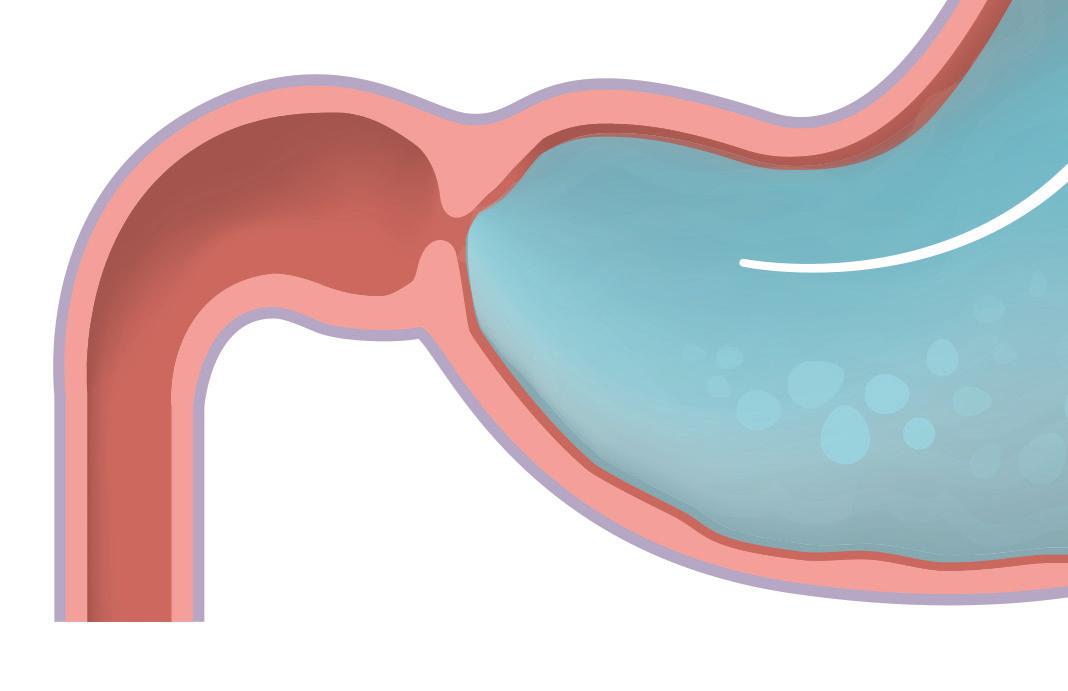
2 minute read
GUT CHECK. Don’t suffer
ESOPHAGUS
DIAPHRAGM
STOMACH


GUT CHECK

DON’T SUFFER NEEDLESSLY WITH THESE TWO COMMON TYPES OF GASTROINTESTINAL DISTRESS.
Stomachaches, constipation and diarrhea are common discomforts that usually pass fairly quickly. “When they don’t, unfortunately, people will oft en suff er with them for a long time, sometimes for years, before they seek help,” says Gregory Lesser, MD, a gastroenterologist with Robert Wood Johnson University Hospital (RWJUH) Rahway.
Two of the most prevalent and most treatable types of gastrointestinal distress, says Dr. Lesser, are gastroesophageal refl ux disease (GERD) and Irritable Bowel Syndrome (IBS). “If you have a GREGORY LESSER, MD pattern of either of these conditions and it’s having a negative impact on your quality of life, you should see a doctor,” he says. “In my experience, we are able to help 80 to 90 percent of the patients we see.” Here, Dr. Lesser gives guidelines for assessing your situation.
GASTROESOPHAGEAL REFLUX DISEASE (GERD)
WHAT IT IS: Irritation of the esophagus (the tube that connects the mouth and stomach) caused by stomach acid. Chronic GERD can cause damage to the esophagus. SYMPTOMS: A burning sensation in the chest after eating, a sour taste in the back of the throat, difficulty swallowing, hoarseness WHAT CAUSES IT: Aggravating factors include stress, obesity and hiatal hernia (bulging of the top of the stomach up into the diaphragm). Certain foods and beverages worsen GERD, especially if eaten before bedtime, including spicy foods, tomato-based sauces, chocolate and caffeinated drinks. Aging is also a factor. WHEN TO SEE A DOCTOR: If you have the condition three or more times a week for several weeks. “We’ll usually try prescription medications fi rst,” says Dr. Lesser. “If a patient has had GERD for longer than a month, we will consider an upper endoscopy—a 10-minute test done with a fl exible camera, under IV sedation in a hospital or surgical center, so we can assess any damage to the esophagus.”
IRRITABLE BOWEL SYNDROME (IBS)
WHAT IT IS: A chronic disorder in which the contents of the colon can’t move along smoothly SYMPTOMS: Cramping, abdominal pain, bloating, gas, diarrhea or constipation WHAT CAUSES IT: Severe infection and changes in gut microbes are suspected. Stress also seems to play a role. “Since the pandemic began, our offi ce has been seeing a lot more people with IBS,” says Dr. Lesser. WHEN TO SEE A DOCTOR: If you have experienced the symptoms for more than two months. “Th e fi rst thing we do is exclude easily treatable causes for the symptoms,” says Dr. Lesser. “We look for markers of celiac disease, and we check for bacteria or parasitic viral infections in the stool. Finally, we might do a colonoscopy to check for signs of infl ammation.”
IBS should not be confused with infl ammatory bowel disease (IBD), which is an umbrella term used to describe debilitating and sometimes lifethreatening disorders such as Crohn’s disease and ulcerative colitis.
Dietary changes can ease the symptoms of GERD and IBS. To work with an Outpatient Dietitian at RWJUH Rahway, call 732.499.6210. To find a gastroenterologist at RWJUH Rahway, call 888.724.7123 or visit www.rwjbh.org/doctors.










